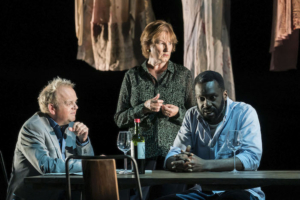Review: GLASS. KILL. BLUEBEARD. IMP., Royal Court

![]() Caryl Churchill returns with a new quartet of shorts - and, at 81, she's still one of the most daring, formally inventive and linguistically dexterous playwrights working today. There's never any sense that her work could slide into another medium; it requires theatre's abstract arena, its live-wire liveness, the crucial space for an audience to bring their own readings, and the very act of storytelling unfolding.
Caryl Churchill returns with a new quartet of shorts - and, at 81, she's still one of the most daring, formally inventive and linguistically dexterous playwrights working today. There's never any sense that her work could slide into another medium; it requires theatre's abstract arena, its live-wire liveness, the crucial space for an audience to bring their own readings, and the very act of storytelling unfolding.
Stories are key to this latest batch - folklore, myths and legends, and also how we frame and reframe events to suit our purpose, particularly those involving violence or transgressive acts. Though different in length, style and tone, each of the four informs the other, so you really get two experiences here: first seeing each play in turn, and then in retrospect, as motifs and ideas layer on top of one another in dark harmony.
Glass is an unsettling fable about a girl literally made of glass (an intricate performance from Rebekah Murrell), and her fragility in a dangerous world. It swings by the humorously surreal - the girl interacting with other ornaments on the shelf, like a clock, a vase and a plastic dog - and into serious territory, as she befriends an abuse victim and is herself bullied and threatened.
It's a clever twist on fairy tales that tackle real-life troubles via allegory, and the piece's lyrical, elusive qualities only heighten the trauma at its centre. Seated on a suspended platform with their feet dangling over the edge, the characters' physical vulnerability is ever-present, but it's Churchill's spare writing that's indelible.
In Kill, a young boy (Caelan Edie last night), representing People, scribbles furiously and occasionally shouts out his rage-filled intentions, while, perched on a cloud, Tom Mothersdale as the Gods cycles through Greek myths (an arch, tour-de-force monologue from Mothersdale). The blood-soaked tales are, of course, teeming with family members maiming one another, generations justifying their power-hungry actions through vengeance - plus absurdities like "one of those races where you win the kingdom and the daughter".
It's both funny and enlightening, stripping back the misty, heroic and poetic portrayal and exposing this behaviour as venal, cruel, brutal, and ludicrous. It's a reminder that violence (and its glorification) is in our founding stories, while the notion of deities who exist only when conjured by belief also speaks to how some actions are framed as part of a greater plan. It feels chillingly contemporary when the Gods speak of how easily we sacrifice our children "when there's a war to be won".
In Bluebeard's Friends, former pals of the infamous serial killer react to the revelation of his murders. It's a sharp satire of the waves of responses to, for example, the #MeToo unmasking of a predator - including claims that we all saw the signs (Deborah Findlay delivering the night's best one-liner: "With hindsight, all those weddings"); disbelief that virtue and evil might co-exist, or that the latter might be combined with charm or talent; cold, commercial exploitation, as the victims' bloody dresses become Halloween costumes and Bluebeard's castle a tourist trap; and how violence becomes softened by being wrapped in a story.
The setting is a series of middle-class dinner parties, creating further distance between a comfortable milieu and this chamber of horrors. It also shows how the former can sometimes lead to us dismissing or diminishing the latter, especially if we lack empathy or are resistant to changing our world view, and who we've chosen to befriend, work with or regard favourably. A superb quartet handle it brilliantly: Sule Rimi, Sarah Niles, Toby Jones and Findlay.
The latter pair also anchor the night's longest piece, Imp - presented on its own after the interval - as bickering, cohabiting cousins, visited by their niece and by a homeless man (subtle, effective turns from Louisa Harland and Mothersdale respectively). It feels slightly Pinteresque, or perhaps closer to Martin McDonagh, in its seemingly conventional domestic drama with weighted references and latent menace - but only Churchill would think of this witty, inspired use of Oedipus, Hamlet, and Romeo and Juliet.
Arguably, it could be closer in length to the three shorter works and still prove effective, but the actors' skill retains our engagement; each tiny shift from cordiality to potential threat is palpable. Jones and Findlay also relish the off-kilter comic beats of this placid-presenting duo with murky depths, as well as the core element of myth: does a corked bottle really contain an imp, capable of inflicting harm on others? Crucial, too, is Christopher Shutt's vivid soundscape.
Throughout, James Macdonald's sensitive direction is perfectly attuned to Churchill's precision, as is Miriam Buether's clever design. Macdonald also adds music hall flair during scene changes: increasingly difficult juggling, and gravity-defying acrobatics. It demonstrates how quickly we become distracted by the performance, thrilled by jeopardy - showing how violence is repackaged as story or entertainment.
Glass. Kill. Bluebeard. Imp. at the Royal Court until 12 October
Read our interview with Rebekah Murrell
Photo credit: Johan Persson
Reader Reviews
Videos

